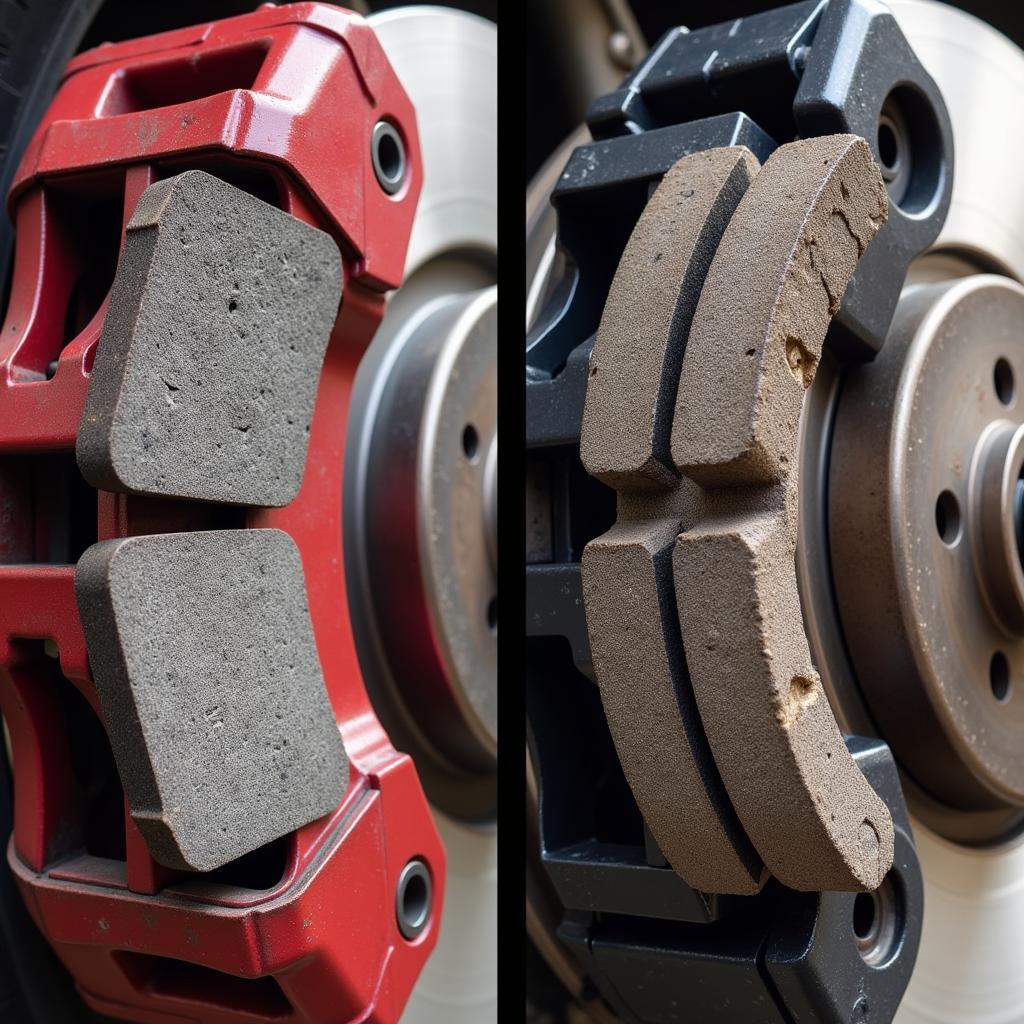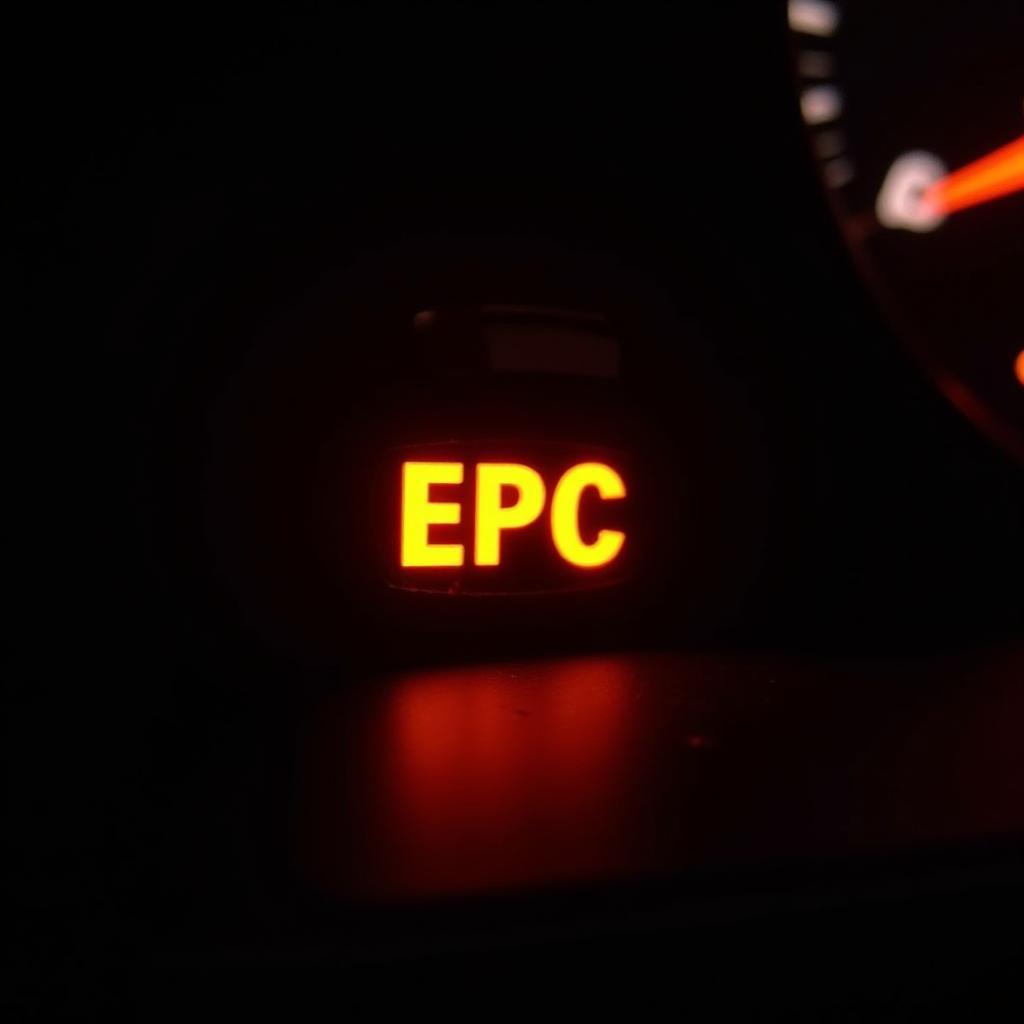The Audi A4 B6 is a reliable car, but like any vehicle, it can experience issues. One common problem is the brake warning light illuminating on the dashboard. This light can indicate various issues, from minor to serious, and addressing it promptly is crucial for your safety and the car’s well-being. This comprehensive guide delves into the common causes of an illuminated brake warning light on an Audi A4 B6 and provides potential solutions.
Understanding Your Audi A4 B6 Brake System
Before diving into the causes, it’s helpful to understand the basics of your Audi A4 B6’s brake system. It’s a sophisticated network of components working together to ensure safe and efficient stopping power. The system primarily comprises:
- Brake Pedal: The interface between you and the braking system.
- Brake Booster: This component amplifies the force you apply to the brake pedal, making braking easier.
- Master Cylinder: This cylinder houses brake fluid and pressurizes it when you press the brake pedal.
- Brake Lines: These lines carry the pressurized brake fluid to the wheels.
- Brake Calipers and Pads: The calipers house the brake pads and press them against the brake rotors to slow down or stop the vehicle.
- Brake Rotors (Discs): These metal discs rotate with the wheels, providing a surface for the brake pads to grip.
- Electronic Stability Program (ESP): This system helps maintain control of the vehicle during cornering and slippery conditions by selectively applying brakes to individual wheels.
- Anti-lock Braking System (ABS): This system prevents the wheels from locking up during hard braking, allowing you to maintain steering control.
Common Causes of an Audi A4 B6 Brake Warning Light
A glowing brake warning light on your Audi A4 B6’s dashboard doesn’t automatically signify a catastrophic failure. It could be something as simple as worn brake pads or something more complex like a faulty ABS sensor. Here are some of the most common culprits:
1. Worn Brake Pads
Brake pads are designed to wear down over time. When they become too thin, the brake warning light will illuminate, indicating it’s time for a replacement. This is the most common reason for the brake warning light to come on.
 Worn Brake Pads on Audi A4 B6
Worn Brake Pads on Audi A4 B6
2. Low Brake Fluid Level
Brake fluid is the lifeblood of your car’s braking system. If the fluid level is low, it can indicate a leak in the system, which can lead to reduced braking performance. A leak should be addressed immediately by a qualified mechanic.
3. Faulty Brake Light Switch
The brake light switch is a small sensor that activates your brake lights when you press the brake pedal. If this switch fails, it can also trigger the brake warning light on your dashboard.
4. ABS Sensor Issues
The ABS system relies on sensors at each wheel to function correctly. A faulty or dirty ABS sensor can disrupt the system and illuminate the brake warning light.
5. Issues with the Brake Booster or Master Cylinder
While less common, problems with the brake booster or master cylinder can also trigger the brake warning light. These issues usually manifest as a spongy or hard brake pedal feel and require immediate attention from a mechanic.
Troubleshooting Your Audi A4 B6 Brake Warning Light
If your brake warning light comes on, here are some steps you can take:
-
Check Your Brake Fluid Level: Safely park your car and allow the engine to cool. Open the hood and locate the brake fluid reservoir (refer to your owner’s manual). The reservoir will have “DOT 3” or “DOT 4” printed on the cap. Check the fluid level, ensuring it’s between the “Min” and “Max” markings. If the level is low, add the appropriate brake fluid (DOT 3 or DOT 4) to the reservoir.
-
Inspect Your Brake Pads: If you’re comfortable with basic car maintenance, you can visually check your brake pads. Look through the spaces between the wheel spokes to assess the thickness of the brake pads. If they appear thin or worn down, it’s best to have them inspected by a professional.
audi 2004 a4 2.0 b6 brake warning lights
- Check Your Brake Lights: Have someone press the brake pedal while you stand behind your car. Ensure all brake lights are functioning correctly. If one or more brake lights are out, it could indicate a faulty brake light switch or a blown fuse.
When to Seek Professional Help
If you’ve checked the above and the brake warning light persists, it’s crucial to seek professional help. Driving with a potential brake system issue can be dangerous. Here are signs you should take your Audi A4 B6 to a qualified mechanic:
- The brake warning light stays on continuously, even after adding brake fluid.
- You notice a spongy or hard brake pedal feel.
- You hear unusual noises (grinding, squealing) when applying the brakes.
- Your car pulls to one side when braking.
- Your ABS or ESP warning lights are also illuminated.
2004 audi a4 brake warning light
Preventive Maintenance for Your Brake System
Regular maintenance can help prevent brake system issues and ensure your safety on the road. Here are some preventative measures:
- Regular Brake Inspections: Have your brakes inspected annually or as recommended in your owner’s manual.
- Timely Brake Pad Replacement: Don’t wait for the brake warning light to come on. Replace your brake pads as recommended by your mechanic or when they reach the minimum thickness specified in your owner’s manual.
- Brake Fluid Flush: Brake fluid absorbs moisture over time, which can reduce its effectiveness. It’s generally recommended to have your brake fluid flushed every two years or as per your owner’s manual.
Conclusion
Addressing a brake warning light on your Audi A4 B6 promptly is vital for your safety and the longevity of your car. By understanding the common causes and following the troubleshooting steps outlined in this guide, you can take the right course of action to rectify the issue. Remember, when in doubt, consult a qualified mechanic. A well-maintained brake system is crucial for a safe and enjoyable driving experience.

